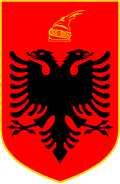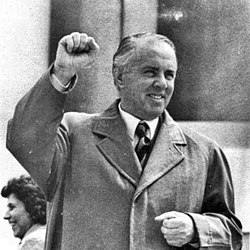| ||||||||||||||||||||||||||||
All 240 seats in the People's Assembly | ||||||||||||||||||||||||||||
|---|---|---|---|---|---|---|---|---|---|---|---|---|---|---|---|---|---|---|---|---|---|---|---|---|---|---|---|---|
| ||||||||||||||||||||||||||||
 |
|---|
Parliamentary elections were held in the People's Republic of Albania on 10 July 1966. [1] The Democratic Front was the only party able to contest the elections, and subsequently won all 240 seats. Voter turnout was reported to be 100%, with only four registered voters not voting. [2]
